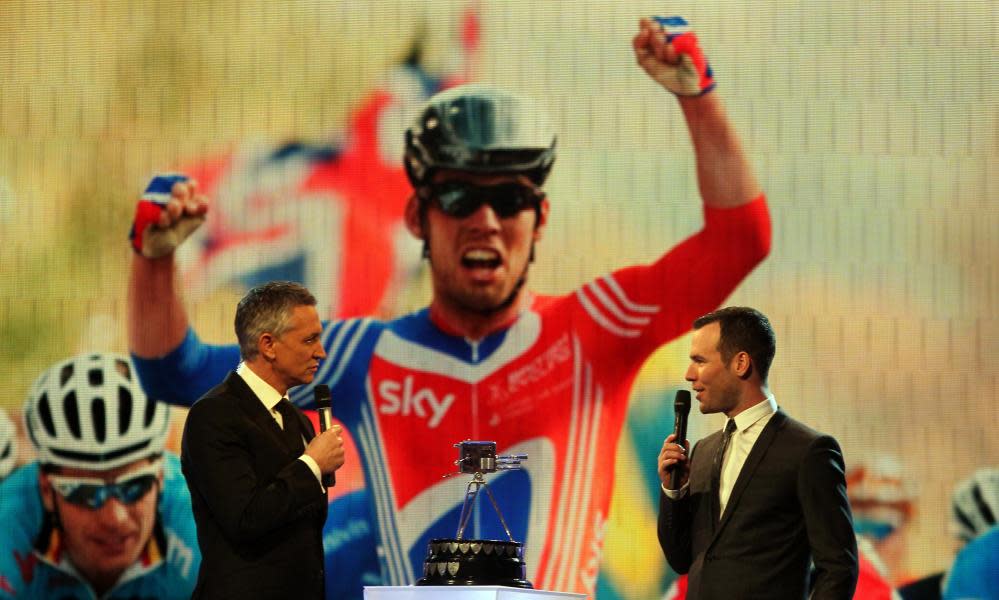Channel 4 is overdue an escape from the London media bubble | Martin Kelner

Gary Lineker, left, has helped the BBC thrive in its new Salford home. Photograph: David Davies/PA
Sometimes I get on the morning train from Leeds to London and wonder what happened to conference calls, to Skype, the internet, and that vision of the future we were once sold of creative types in their ecologically sound homes in Yorkshire or Somerset, skipping off on the school run, and then sitting by their laptops in jeans and casual footwear, gazing out at the mountain greenery while remaining at the nation’s media coalface.
Judging by the suited and booted on Virgin East Coast’s red-eye, it went the way of flying cars and robots doing the vacuuming.
Partly this is down to the well-advertised deficiencies in broadband networks (sometimes you hear radio interviews via Skype that sound as though they might as well have been done using two cocoa tins), but more likely it’s thanks to the attitude Karen Bradley, the culture secretary, identified in her speech at the Nations and Regions Media Conference – of organisations “who recoil in horror at the very idea of media jobs being based outside the capital”. Organisations such as Channel 4, that is.
She is not sympathetic, and her logic is impeccable. If Channel 4 is to remain publicly owned, as the government has now pledged, its benefits, says the minister, ought to be “spread far and wide, not just in London”.
So they should, but as a semi-professional broadcaster and journalist living in the north, I think I understand the channel’s reluctance to move.
The most recent example of the benefits of a media base being spread far and wide is the move of some BBC programmes and departments to Salford.
“Dragging and screaming” does not quite cover the attitude of some of the BBC’s semi-famous names to being dumped by the Manchester Ship Canal. Some refused to move. Sian Williams, for instance, stayed put in London, and the north of the nation wept. The newspaper stories of eye-watering hotel bills, flights, removal costs and so on weren’t entirely helpful either.
But the move has created jobs, and undoubtedly boosted media activity up here; and if rather too much of BBC Breakfast is taken up by interviews with “experts” from the University of Heckmondwike and the Little Hulton Technology Campus (made up, but you know what I mean), that seems a small price to pay.
Sure, it would be foolish to deny that some of the BBC’s Manchester output is a little underpowered, but if Gary Lineker is happy to sit by the canal and present Match of the Day, still the best football programme on TV, clearly fine broadcasting can emanate from outside London.
Channel 4, of course, cannot be compared directly to the BBC, as it commissions programmes rather than making them itself, and it argues that it already buys in more than half its output from outside London, including the long-running Hollyoaks, and Caitlin Moran’s Raised By Wolves, made in Birmingham. But only 30 of its 800 staff are based outside central London, and arguably it views the provinces through London goggles. If you are pitching a programme from the north or any of the regions, you will certainly have to go to London and attend plenty of stultifying meetings, not unlike those satirised in the comedy W1A.
Maybe if Channel 4 were to move, say, another 200 of its people out of London – and persuade them not to live in Didsbury, which is really just Crouch End with a little more rain – they would get a view of the regions from the regions, and might understand better what programme-makers up here were trying to say.
It’s easy to imagine the benefits. Too late now, but I’m sure I’m not alone in thinking if more journalists and broadcasters had been based outside the London media bubble, there might have been a better understanding of what was going on in the EU referendum campaign.
When Channel 4 launched 35 years ago, diversity was its watchword. But it was only really a slogan, best illustrated by a friend of mine who failed to get a job there and was told (I’m not making this up): “We’re really looking for somebody from a disadvantaged background, maybe somebody disabled.” To which she replied, “I’m from Leicester; how disadvantaged do you want?”
Now might be an ideal opportunity for Channel 4 to go along with Karen Bradley, to prove you can genuinely embrace the rest of the nation.

 Yahoo News
Yahoo News 
